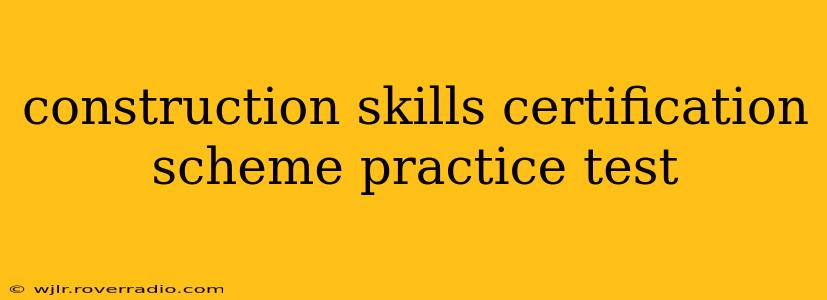Are you ready to take the Construction Skills Certification Scheme (CSCS) test? This comprehensive practice test will help you prepare for exam day and boost your confidence. We'll cover a range of topics crucial for passing, ensuring you're well-equipped to demonstrate your knowledge of health, safety, and environmental awareness in the construction industry.
Understanding the CSCS Test
The CSCS test is designed to assess your understanding of health and safety regulations on construction sites. Passing the test is essential for obtaining a CSCS card, which is often a mandatory requirement for working on construction projects in the UK. The exam covers a wide range of topics, including:
- Health and safety regulations: This is the core of the exam, covering legislation, risk assessment, and safe working practices.
- Environmental awareness: Understanding the environmental impact of construction activities and best practices for minimizing harm is crucial.
- Working safely with others: Cooperation and communication on site to ensure everyone's safety.
Practice Questions and Answers
Let's dive into some sample questions to test your knowledge. Remember, these are just examples, and the actual exam may cover different aspects in more detail.
1. What does the acronym RAMS stand for?
A. Risk Assessment Management System B. Risk Assessment Method Statement C. Review Assessment Management System D. Review Assessment Method Statement
Answer: B. Risk Assessment Method Statement A RAMS is a crucial document outlining the potential hazards of a specific task and the measures to mitigate those risks.
2. Which of the following is NOT a common cause of accidents on construction sites?
A. Inadequate training B. Poor communication C. Proper risk assessment D. Lack of supervision
Answer: C. Proper risk assessment. While a well-executed risk assessment is crucial for preventing accidents, its absence is a common cause. Options A, B, and D are all significant contributors to accidents.
3. What is the purpose of a toolbox talk?
A. To discuss the latest gossip on the site. B. To provide brief safety updates and discussions before starting work. C. To plan the day’s work schedule. D. To distribute tools and equipment.
Answer: B. To provide brief safety updates and discussions before starting work. Toolbox talks are short, focused sessions designed to address immediate safety concerns and reinforce good practice.
4. What should you do if you see a hazard on a construction site?
A. Ignore it and continue working. B. Report it to your supervisor immediately. C. Try to fix it yourself. D. Warn your colleagues, but don't report it.
Answer: B. Report it to your supervisor immediately. Reporting hazards promptly is crucial for preventing accidents and ensuring everyone's safety. Never attempt to fix a hazard without proper training and authorization.
5. What is the primary legislation covering health and safety in the workplace in the UK?
A. The Environmental Protection Act B. The Health and Safety at Work etc. Act 1974 C. The Construction (Design and Management) Regulations 2015 D. The Equality Act 2010
Answer: B. The Health and Safety at Work etc. Act 1974. This Act forms the foundation of UK health and safety law. While CDM regulations are crucial for construction, the overarching legislation is the Health and Safety at Work Act.
H2: What are the different types of CSCS cards?
The CSCS offers various cards catering to different skill levels and professions within the construction industry. Some common types include:
- CSCS Skilled Worker Card: This is the most common card, requiring a relevant NVQ/SVQ or equivalent qualification and a successful health and safety test.
- CSCS Labourer Card: Specific for labourers, requiring a health and safety test and often some basic training.
- CSCS Manager/Professional Card: For those in management positions, often requiring more advanced qualifications and experience.
H2: How long is a CSCS card valid for?
CSCS cards are typically valid for two years. To maintain your card, you'll need to renew it before expiry, usually involving retaking the health and safety test.
H2: Where can I find more CSCS practice tests?
Numerous websites and resources offer additional CSCS practice tests. Searching online for "CSCS practice test" will yield many results. Reviewing multiple tests helps broaden your understanding of the material.
H2: What topics are covered in the CSCS test?
The test comprehensively covers various health and safety aspects, including:
- Personal Protective Equipment (PPE): Understanding the correct use and importance of PPE.
- Working at Heights: Safe practices for working at height, including scaffolding and fall protection.
- Manual Handling: Safe techniques for lifting and carrying heavy objects.
- Fire Safety: Understanding fire prevention measures and emergency procedures.
- Risk Assessments: Understanding the process of risk assessment and its importance.
This practice test offers a glimpse into the type of questions you can expect. Remember thorough preparation is key to success. Good luck with your CSCS test!
